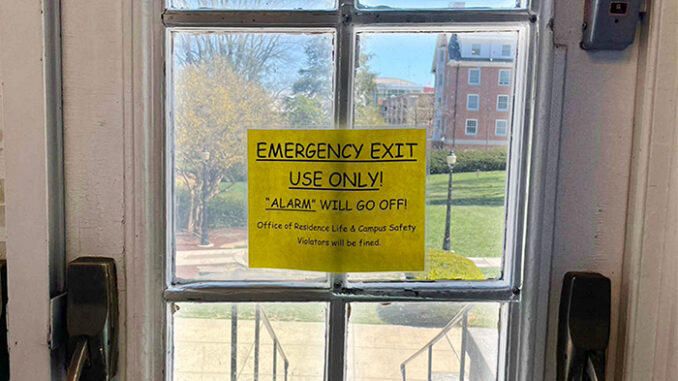
By Amanda Smith//
Hood College reactivated the emergency exit alarm system in the residence halls over spring break.
If these exits are used in instances of non-emergencies, an alarm will go off and the individual will be identified through the use of surveillance cameras. Once identified, the individual will then be required to pay a fine of up to $250.
According to Thurmond Maynard, director and chief of campus safety, the emergency exit alarm system in the residence halls was taken offline during COVID to minimize safety risks.
“When COVID hit, we wanted to make sure that students had many different ways to exit the building,” Maynard said. “The goal was to try to maximize the distance between people so that everyone wasn’t going out the same way.”
However, the school had started running into issues with people propping these doors open, which posed a risk to campus safety.
“We’ve been finding, especially this semester, more and more doors propped open with anything and everything: rocks, wedges, papers,” Maynard said.
Additionally, students had begun using the doors out of convenience too frequently. “People didn’t want to walk all the way back around to certain entrances, some doors were closer to parking lots,” Maynard said.
According to Maynard, emergency exits should only be used in instances where something significantly dangerous is happening.
“If there’s a fire, if the building is being evacuated, if somebody is injured and they need to get out of the building as fast as possible, that’s what we’re defining as an emergency,” Maynard said.
Furthermore, developing stricter policies on when these exits can be used will protect the campus from suspicious intruders.
“It’s an open campus, I always think about when it gets cold outside, maybe there’s people looking for a warm space,” Maynard said. “We don’t want to give them any access to open areas, especially where our residents live. We just don’t want anybody startled by people that they don’t recognize.”
“I’ve seen many students use the emergency doors for non-emergency purposes,” said Gabbi Ntali, a sophomore at Hood College. “I would say with this new addition of blocking the emergency doors and using them strictly for emergencies is great because they get to retain their actual purpose and I feel like it makes the campus more safe overall.”
“We don’t want suspicious people walking in off the street,” Maynard said. “We want everybody to do their part to keep themselves and all of their neighbors safe.”




Be the first to comment